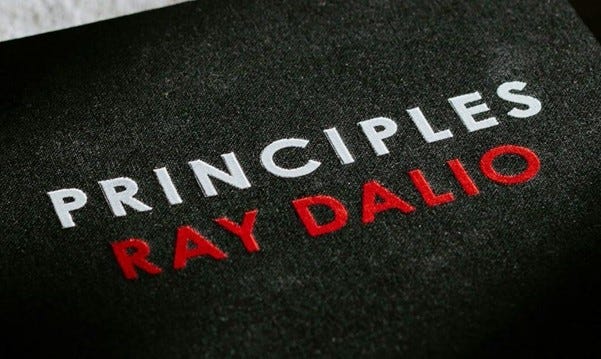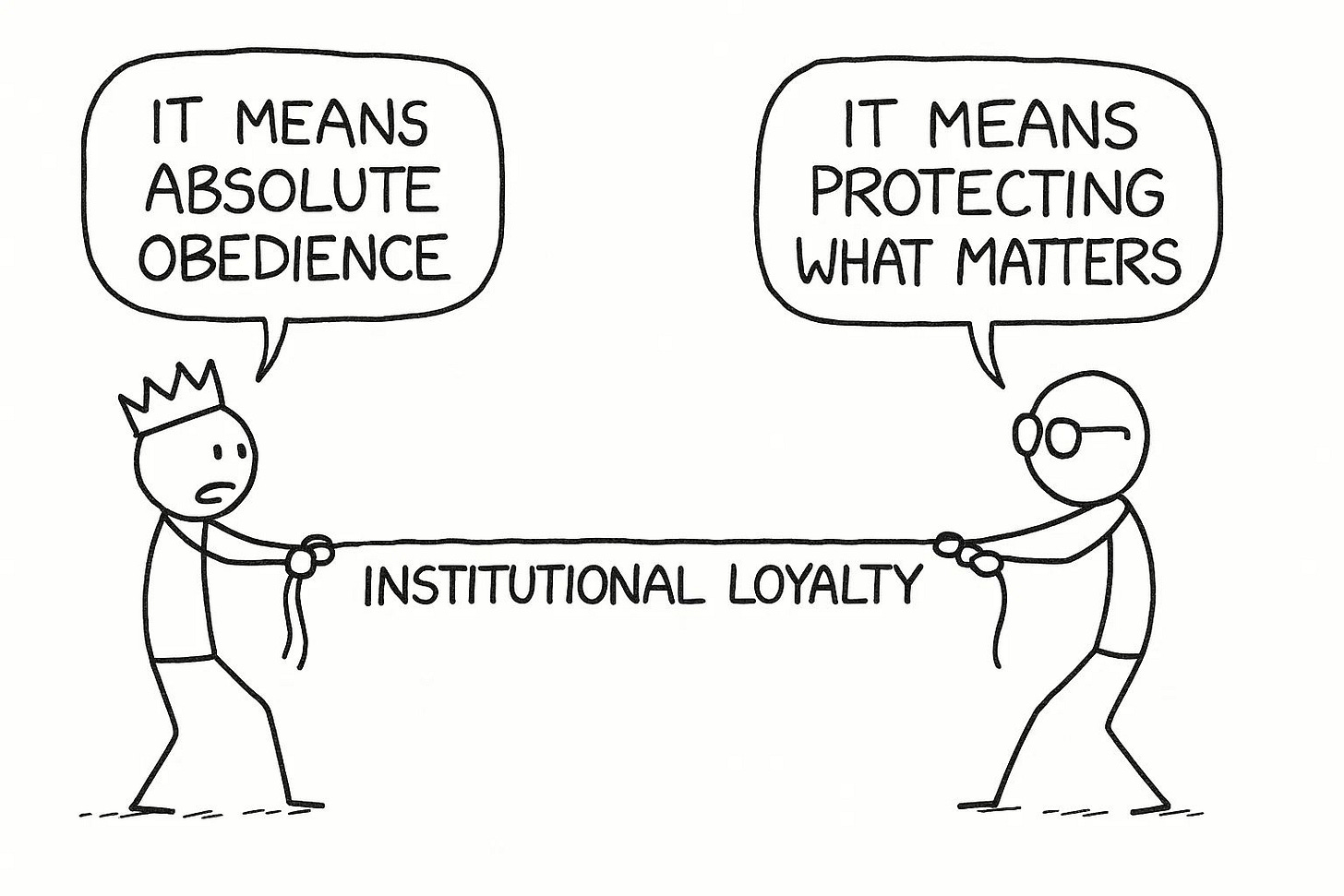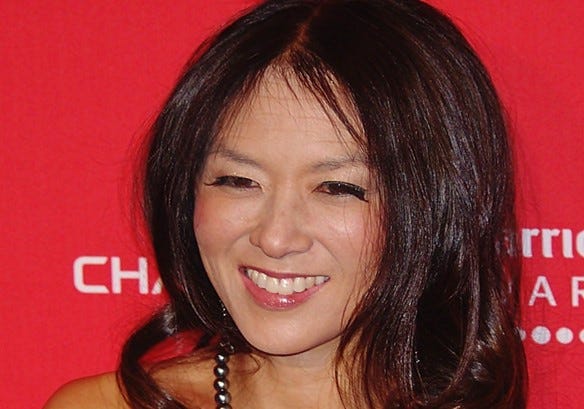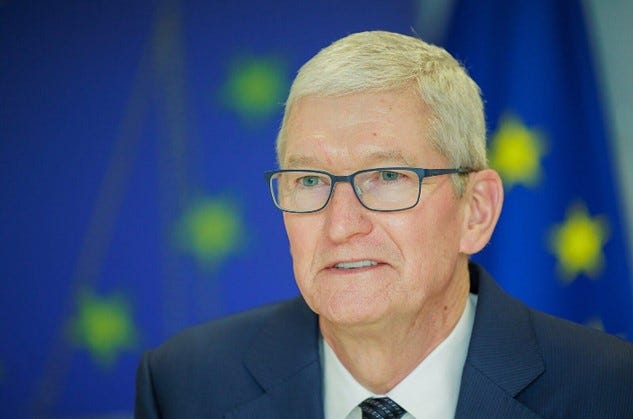What Harvard and J.D. Vance Teach Us About Loyalty’s Breaking Point
Defiance as Strategy—How the Right “No” Becomes Your Brand’s Strongest “Yes”
Key Takeaways
Principled defiance becomes brand capital. Harvard’s stand—and Apple’s earlier iPhone showdown—prove that a well-timed “no” rooted in values can generate the strongest “yes.”
Create cognitive dissonance. Force adversaries to choose between their rhetoric and their actions; that tension splinters their coalition and shifts the debate.
The “quiet life” is gone. In an always-on, hyper-transparent world, neutrality is a myth; anchoring every decision to your organization’s core purpose is the only durable reputation shield.
The other night, I scrolled through LinkedIn. A post stopped me.
There he was—Ray Dalio, the Bridgewater billionaire hailed as a genius and mocked for his cult-like “radical transparency.” On my screen was a black image with white text:
Recognize that if the people who have the power don’t want to operate by principles, the principled way of operating will fail.
Here’s a hedge fund legend who dissects empires like a surgeon, peeling back the layers of history to expose why nations rise, dominate, and crumble. His upcoming book, How Countries Go Broke, isn’t just another CEO memoir. It’s an autopsy of empires: the Dutch Golden Age, the British Empire, dynastic China, and America’s fragile reign.
What happens when leaders prioritize self-interest over equity? When the powerful trade principles for profit? Dalio’s answer is simple: decline is inevitable. A rising nation will take your place.

Dalio’s charts map inevitability—but they ignore one aspect: human agency. As Margaret Mead insisted, “Never doubt that a small group of thoughtful, committed citizens can change the world.”
Human Agency in History
History isn’t just about cycles. It’s also about the exact moments when insiders—people within power structures—decide to resist.
If America’s slide stems from Trumpism’s hard-edged populism, the turning point won’t come from the opposition. It will come from loyalists with clout who quietly say, “Enough.” Not with loud protests, but with small, principled defiance. A senior aide stops repeating the lies. A donor turns off the money spigot. A precinct boss mutters, “This crosses the line.”
One defection becomes two, then twenty.
What could spark that chain reaction? Not reason, but a visceral recoil—the same gut-level instinct that powered Trump’s ascent.
History whispers that it’s possible: Roman senators turned on Nero. South African cabinet members walked away from apartheid. Khrushchev broke with Stalin in 1956. Each shift began with a cultural counter-current that rattled the emotional bedrock.
And now, that counter-current may be developing in a seemingly niche battleground—Harvard.
From Elite Brand to Cultural Phenomenon
Last week Harvard sued the Trump administration, fighting a threatened multi-billion-dollar funding freeze after it refused to muzzle campus activism. Suddenly, against all odds, Harvard became cool. It was no longer Harvard, the elite brand with a $53 billion endowment and centuries of privilege, but instead Harvard, the Marvel hero in tweed, sparring with an overreaching state to protect free inquiry.
“No government—regardless of which party is in power—should dictate what private universities can teach, whom they can admit and hire, and which areas of study they can pursue,” Alan Garber, its president, wrote in a public letter. The oldest U.S. university flipped from emblem of privilege to rebel icon.
The counterpunch was cinematic. Within hours of the federal freeze, the crimson giant repainted its homepage—not with lofty mission statements but with real-world wins:
the sickle-cell therapy that’s now saving toddlers
the quantum chip powering tomorrow’s laptops
the first golf tee (invented in 1899 by a Black dentist, no less)
Translation: cut Harvard, and America bleeds.
Beyond One Campus: The Ripple Effect
What happens next isn’t just about Harvard. With the administration stretched thin fighting tariff fallout, stock market tremors, and China tensions, they can’t police every campus. As Harvard holds the line, other institutions watch closely, calculating their own quiet resistance.
After all, the federal bureaucracy has already been depleted by layoffs, and most career staff at education and research agencies lean liberal by temperament. Their faculties tilt left, their students crave dissent, and their very DNA rejects authoritarianism. Harvard’s stand gives cover to the next wave—Yale, Stanford, even red-state flagships—while Columbia’s earlier surrender bred chaos—faculty infighting, donor revolts.
The lesson? Unity beats surrender.
But how does this shift the cultural tide within Trump's circle? For MAGA loyalists who had spent years sneering at “coastal elites,” the cognitive dissonance was brutal: What if the institution they’d vilified held the keys to their grandsons’ survival? This brings us to J.D. Vance before the rallies, before the gilded stage—once a nobody with a notebook. He wrote Hillbilly Elegy—which I loved at the time. I read it and gave it a 5 on Goodreads. It felt honest, raw.
So, let’s talk about the growing up of this vice president.
From Trailer Parks to Mar-a-Lago
“To understand me, you must understand that I am a Scots-Irish hillbilly at heart.” J.D. Vance’s words paint trailer parks, fractured family ties, and a Rust Belt childhood in Middletown, Ohio. Hard work alone might’ve left him stocking shelves at Walmart, but Yale Law School changed everything. There, Professor Amy Chua, author of Battle Hymn of the Tiger Mother, guided him across alien terrain.
At Vance’s first recruitment dinner, in a mahogany-paneled restaurant, the waiter asked if he’d prefer still or sparkling water. Sparkling? Vance pictured diamonds in a glass. He took one sip and nearly spat it out. It tasted, he wrote, “Like Diet Coke without enough syrup.” By dessert he’d learned “sparkling” simply meant fizzy water.
Professor Chua didn’t just teach him etiquette. She taught him how to talk to white-shoe partners and—crucially—how to tell his story without apology. She must have edited his early chapters with brutal red ink and connected him to HarperCollins editors she knew.
Yale didn’t just educate Vance—it remade him.
The Alchemy of Belonging
Stories like that play out daily. Universities are alchemy labs where uncalculated kindness from professors, counselors, physicians, classmates, and roommates transmutes potential into purpose. Dorms and lecture halls aren’t just settings for academic rigor. They’re where identities crystallize, friendships ignite, and outsiders become insiders.
Universities are not mere springboards to success; they’re where we discover who we are. Threaten someone’s alma mater, and political math dissolves. It’s not policy—it’s arson, torching the village that raised you.
For the first time in years, I opened a Harvard alumni email.
Like most business school graduates, I’d long ignored the newsletters cluttering my inbox, but last week, I read every word. I clicked the link to vote for the Board of Overseers, studied each candidate’s bio, and cast my vote for the first time. I never imagined Harvard would need my help, but with the university under assault, a routine ballot felt like a shield worth raising.
Even Scott Galloway, the NYU professor who slams higher education as a luxury racket, credits UC Berkeley for saving him. If the Trump administration targeted Berkeley—say, stripping its nonprofit status over student activism—would he stay silent? Or would he and media titans like Kara Swisher weaponize their podcasts to defend it?
This is the administration’s blind spot. Scroll Joe Rogan’s guest list—ex-Navy SEALs, crypto bros, cancer researchers. Scratch half of those bio lines, and you’ll hit a campus lab or GI Bill lecture hall. Threaten their schools, and the “anti-woke” coalition suddenly fractures along lines of gratitude.
No one feels good watching their homeland burn.
That’s why Harvard won’t bend. The cost of accommodating Trump far outweighs the benefit of giving cover to other universities, big and small, to mount their own resistance. Harvard’s defiance is also about exposing the lie that elites like Vance who romanticized Appalachian grit enable policies that sabotage the labs researching opioid alternatives.
Creating Cognitive Dissonance as Strategy
The surest way to weaken an entrenched opponent is to throw their own story back at them. Harvard did that. So did Apple in 2016. When the FBI demanded that it build a back door to the San Bernardino shooter’s iPhone, Tim Cook framed the fight not as Apple vs. national security but as privacy vs. overreach.
Millions of iPhone owners suddenly saw themselves—not a tech giant—under the government’s thumb. By forcing Washington to confront its own rhetoric about individual liberty, Apple flipped the power dynamic and cemented its “Think Different” credo without spending a cent on ads. The public rallied behind them, not because the issue was simple but because Apple made opposing them feel like a betrayal of personal values.
This is more than clever PR—it’s a calculated play on human psychology.
Such approach, of course, requires extraordinary courage -- the willingness to bet your organization's future on your deepest principles rather than temporary accommodations.
The Quiet Life Is Dead
For decades, CEOs and business executives clung to the “quiet life”: avoid politics, maximize profits, repeat. But neutrality is a myth. Businesses are now cornered—not just by activists or regulators, but by employees, customers, and algorithms that amplify every compromise. The choice isn’t whether to take a stand but how.
Bankruptcies come in many forms. Financial collapse is one; reputational rot is another. The only anchor left is true value -- not stock prices or quarterly reports but the irreducible core of why you exist.
For Harvard, it’s truth seeking. For Patagonia, planetary stewardship. For any pharmaceutical companies where tariffs are coming, lifesaving science. Similarly, David Bach, President of IMD—where I work as a professor—argues, “Inclusiveness is not a trend. It’s a test of leadership.”
Columbia's initial compromise bred only internal conflict, while Harvard's defiance has sparked what may become a nationwide movement. The difference wasn’t resources—both command vast endowments—but vision. One tried to survive the moment. The other set out to define it.
Adam Grant puts it plainly:
Our greatest regrets are rarely failures to reach our goals. They’re usually failures to uphold our values… Success is building a career. Fulfillment is building character.
History may rhyme, but it never writes the next line. Nothing is inevitable—nations, companies, individuals. Nothing is prewritten. Whether you’re running a university, a startup, or a trillion-dollar hedge fund, the choice is the same: chase the quiet life or build the kind of character that weathers storms and writes a great verse to follow.










Fundamental inisghts, sound, human and with reslience
Brilliant insights, Professor Howard. I loved how you highlighted the power of principled defiance and the urgency of anchoring actions to core values. A timely, thought-provoking read!